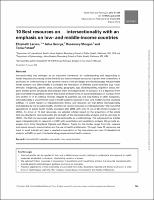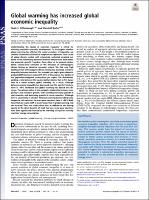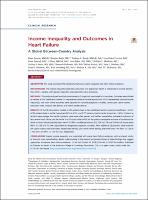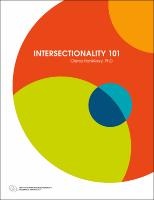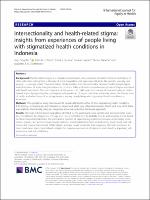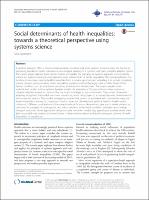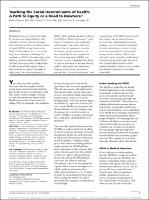Browsing 1.01 Frameworks & Analysis by Resource Type "journalArticle"
Now showing items 1-8 of 8
-
10 Best resources on… intersectionality with an emphasis on low- and middle-income countries
(Health Policy and Planning, 2016-10-01)
Intersectionality has emerged as an important framework for understanding and responding to health inequities by making visible the fluid and interconnected structures of power that create them. It promotes an understanding of the dynamic nature of the privileges and disadvantages that permeate health systems and affect health. It considers the interaction of different social stratifiers (e.g. ‘race’/ ethnicity, indigeneity, gender, class, sexuality, geography, age, disability/ability, migration status, religion) and the power structures that ... -
Global warming has increased global economic inequality
(2019-05-14)
Significance We find that global warming has very likely exacerbated global economic inequality, including ∼25% increase in population-weighted between-country inequality over the past half century. This increase results from the impact of warming on annual economic growth, which over the course of decades has accumulated robust and substantial declines in economic output in hotter, poorer countries—and increases in many cooler, wealthier countries—relative to a world without anthropogenic warming. Thus, the global warming caused by ... -
Global warming has increased global economic inequality
(The Journalist's Resource, Shorenstein center on media, politics and public policy, Harvard Kennedy School, 2019-05-14)
Significance We find that global warming has very likely exacerbated global economic inequality, including ∼25% increase in population-weighted between-country inequality over the past half century. This increase results from the impact of warming on annual economic growth, which over the course of decades has accumulated robust and substantial declines in economic output in hotter, poorer countries—and increases in many cooler, wealthier countries—relative to a world without anthropogenic warming. Thus, the global warming caused by ... -
Income Inequality and Outcomes in Heart Failure
(2019)
OBJECTIVES This study examined the relationship between income inequality and heart failure outcomes. BACKGROUND The income inequality hypothesis postulates that population health is influenced by income distribution within a society, with greater inequality associated with worse outcomes. METHODS This study analyzed heart failure outcomes in 2 large trials conducted in 54 countries. Countries were divided by tertiles of Gini coefficients (where 0% represented absolute income equality and 100% represented absolute income inequality), and heart ... -
INTERSECTIONALITY 101
(Institute for Intersectionality Research and Policy)
Interest in and applications of intersectionality have grown exponentially in popularity over the last 15 years. Scholars across the globe from a variety of disciplines, including sociology, political science, health sciences, geography, philosophy and anthropology, as well as in feminist studies, ethnic studies, queer studies and legal studies, have drawn on intersectionality to challenge inequities and promote social justice. This practice has also extended to policy makers, human rights activists and community organizers search - ing ... -
Intersectionality and health-related stigma: insights from experiences of people living with stigmatized health conditions in Indonesia
(International Journal for Equity in Health, 2020-12)
Abstract Background Health-related stigma is a complex phenomenon, the experience of which intersects with those of other adversities arising from a diversity of social inequalities and oppressive identities like gender, sexuality, and poverty – a concept called “intersectionality”. Understanding this intersectionality between health-related stigma and other forms of social marginalization can provide a fuller and more comprehensive picture of stigma associated with health conditions. The main objective ... -
Social determinants of health inequalities: towards a theoretical perspective using systems science
(2015)
A systems approach offers a novel conceptualization to natural and social systems. In recent years, this has led to perceiving population health outcomes as an emergent property of a dynamic and open, complex adaptive system. The current paper explores these themes further and applies the principles of systems approach and complexity science (i.e. systems science) to conceptualize social determinants of health inequalities. The conceptualization can be done in two steps: viewing health inequalities from a systems approach and extending it to ... -
Teaching the Social Determinants of Health: A Path to Equity or a Road to Nowhere?
Medical schools are increasingly called to include social responsibility in their mandates. As such, they are focusing their attention on the social determinants of health (SDOH) as key drivers in the health of the patients and communities they serve. However, underlying this emphasis on SDOH is the assumption that teaching medical students about SDOH will lead future physicians to take action to help achieve health equity. There is little evidence to support this belief. In many ways, the current approach to SDOH within medical ...

